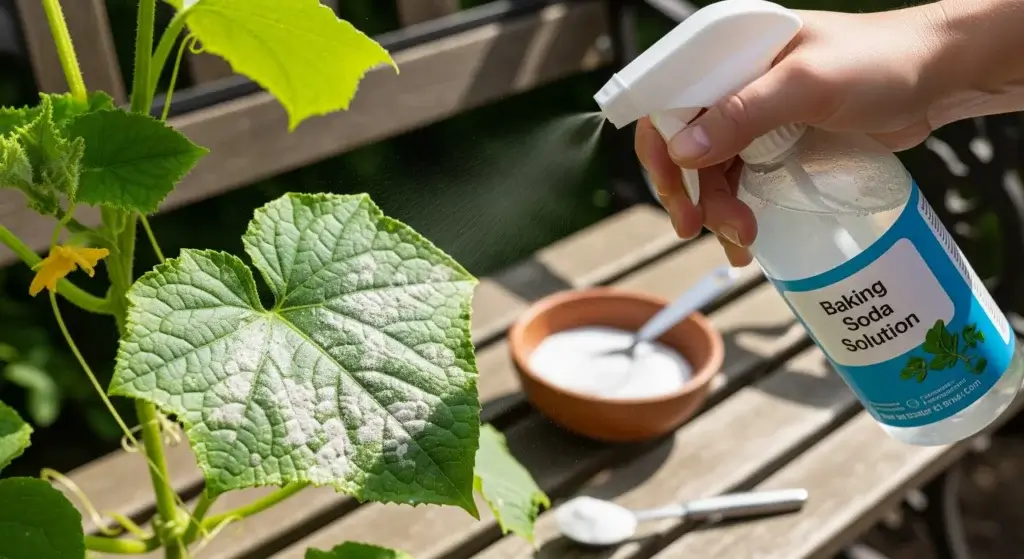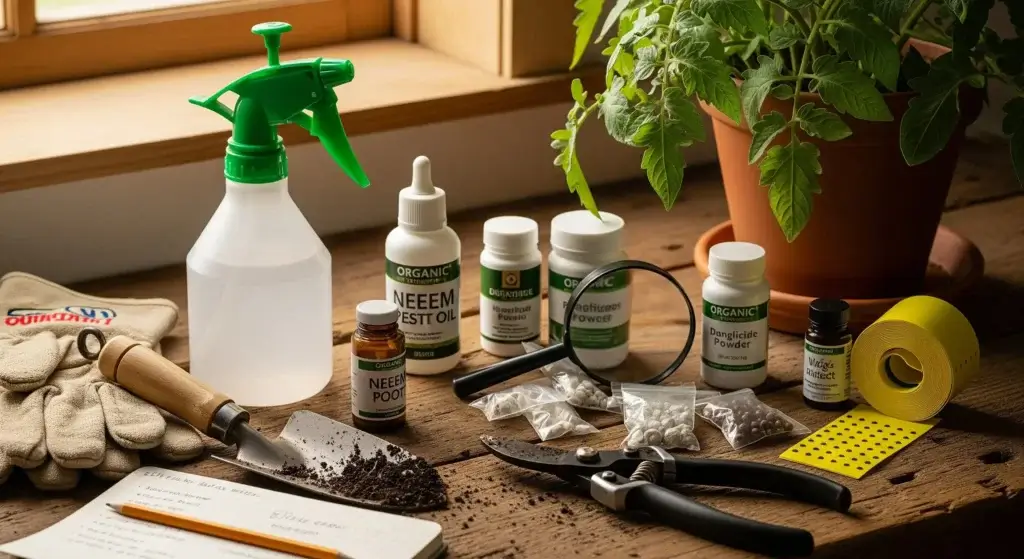
Step into the world of broccoli gardening, where every leaf shares tales of perseverance, development, and occasional battles against pests.
But worry not, for in this journey of greenery, we’re accompanied by some small yet mighty allies – beneficial insects.
These humble heroes quietly watch over our broccoli patches, safeguarding their well-being and vigor in a natural, environmentally-friendly way.
What are The Advantages of Beneficial Insects for Broccoli Plants
Broccoli is such a lovely vegetable with its vibrant green florets, isn’t it? Not only is it tasty, but it’s also packed with nutrients.
However, one of the challenges of growing broccoli is keeping it free from pests.
Thankfully, there’s a natural solution: beneficial insects.
These little helpers bring a host of benefits to your broccoli plants, helping them flourish and ensuring a more abundant harvest.
Let’s take a closer look at why attracting these helpful creatures to your garden is a great idea:
- Read also: Exploring Effective Organic Pest for Protecting Broccoli Plants
- Read also: DIY Guide: Homemade Compost for Growing Broccoli
Natural pest control
By introducing these allies into your garden, you can effectively reduce pest populations without resorting to harmful chemical pesticides.
Reduction of harmful pesticides
By relying on beneficial insects for pest control, gardeners can significantly reduce or even eliminate the need for harmful chemical pesticides, promoting a more eco-friendly approach to gardening.
Pollination assistance
In addition to pest control, beneficial insects play a vital role in pollination, ensuring robust growth and bountiful harvests of broccoli florets.
Hoverflies and other pollinators help transfer pollen between broccoli flowers, facilitating the development of healthy fruits and seeds.
Maintenance of ecosystem balance
Beneficial insects contribute to the overall health and balance of the garden ecosystem by preying on pests, promoting pollination, also they can attract other helpful creatures to create a natural food chain.
Enhanced crop quality
With the assistance of beneficial insects, broccoli plants are less susceptible to damage from pests, resulting in higher-quality produce with fewer blemishes and deformities.
The natural pollination provided by beneficial insects also leads to more uniform and consistent growth of broccoli florets, enhancing their appearance and flavor.
Long-term pest control
Unlike a one-time chemical application, beneficial insects offer continuous pest control.
They reproduce in your garden, creating a sustainable population that keeps pest numbers in check over time.

What are Some Common Pests Affecting Broccoli Plants
Let’s get to know some of the most common broccoli bullies and the damage they cause:
Aphids
These tiny, soft-bodied insects are like the ultimate plant juice thieves.
They congregate on the undersides of leaves, sucking out the sap and nutrients.
This weakens the plant, leading to stunted growth, yellowing leaves, and a sickly appearance.
Caterpillars
Think of these guys as the broccoli buffet crashers.
There are many types of caterpillars that target broccoli, but some of the most common culprits include the imported cabbage worm, the diamondback moth caterpillar, and the cabbage looper.
These munching machines can devour leaves at an alarming rate, leaving behind a trail of destruction and hindering the plant’s ability to photosynthesize.
Flea beetles
These tiny, jumping insects might seem insignificant, but they pack a punch.
They leave behind a pattern of small holes in the leaves, giving your broccoli a shot-putty appearance.
A heavy flea beetle infestation can significantly reduce plant growth and hinder yield.
Cabbage maggots
These aren’t technically insects, but they’re definitely broccoli bullies.
The adult flies lay eggs near the base of the broccoli plant, and the hatched maggots burrow into the stem, causing wilting, stunted growth, and even plant death in severe cases.
Cutworms
These nocturnal caterpillars cut seedlings off at the ground level, leaving you with nothing but a sad, wilted stem.
Cutworms can be particularly devastating to young broccoli plants, hindering your harvest before it even gets started.
Which Insects are Beneficial for Broccoli Plants

Nature provides a fantastic defense system in the form of beneficial insects.
These tiny warriors play a crucial role in keeping your broccoli patch healthy and thriving.
Let’s meet some of the most valuable members of your broccoli bodyguard squad:
Ladybugs (Coccinellidae)
With their striking red wings, ladybugs are iconic symbols of beneficial insects.
These voracious predators have a particular appetite for aphids, making them invaluable allies in controlling aphid populations.
A single ladybug can consume hundreds of aphids in a day, effectively keeping these pesky pests in check and protecting our broccoli plants from damage.
Lacewings (Neuroptera)
Lacewings, often dubbed “aphid lions” for their ferocious appetite, are formidable predators of soft-bodied insects.
The larvae of lacewings voraciously feed on aphids, mites, and other small pests.
They’re ambush hunters, using their sharp mandibles to capture and devour their prey.
Hoverflies (Syrphidae)
Resembling tiny bees with their buzzing flight, hoverflies are not only pollinators but also effective predators of soft-bodied pests.
Equipped with a keen sense of smell, hoverflies seek out aphid colonies and other pests, eliminating them with precision.
Parasitic wasps (Braconidae & ichneumonidae)
Despite their intimidating name, parasitic wasps are valuable allies in biological pest control.
These tiny wasps lay their eggs inside pest insects such as aphids and caterpillars, effectively parasitizing them and reducing pest populations.
Ground beetles
Ground beetles are nocturnal predators that feed on a variety of garden pests, including caterpillars, slugs, and snails.
Their voracious appetite for pests and their habit of patrolling the soil surface, helps to keep populations in check, reducing the need for chemical pesticides.
Minute pirate bugs (Anthocoridae)
These tiny, fast-moving insects are like the ninjas of the beneficial insect world.
They use their piercing mouthparts to suck the fluids out of aphids, thrips, and other small pests.
Minute pirate bugs are particularly effective at controlling early-stage pest infestations before they can explode in population.
How to Attract Beneficial Insects

By making a few changes, you can transform your garden into a safe haven for these little helpers.
This not only helps protect your broccoli naturally but also encourages a healthy balance in your garden’s ecosystem.
Here are some key strategies to attract beneficial insects:
Plant a diverse array of flowers
Beneficial insects are attracted to flowering plants that provide them with essential food sources such as nectar and pollen.
Incorporate a variety of flowers in and around your broccoli patch to attract and sustain beneficial insect populations.
Choose flowers like marigolds, cosmos, dill, alyssum, and flowering herbs such as basil and cilantro to create a diverse and enticing environment.
Avoid pesticides
Chemical pesticides not only harm pests but also repel beneficial insects, disrupting the delicate balance of the garden ecosystem.
Opt for organic pest control methods such as handpicking pests, using natural predators like ladybugs and lacewings, or employing botanical insecticides derived from plant-based ingredients.
Provide shelter
Beneficial insects require shelter for resting, nesting, and reproducing.
Create habitat features in your garden to offer refuge to these beneficial bugs, such as hedgerows, rock piles, or insect hotels.
Planting dense vegetation, such as ornamental grasses or shrubs, provides additional cover and nesting sites for beneficial insects, enhancing their overall presence in the garden.
Provide water
Ensure that beneficial insects have access to water sources such as shallow dishes or birdbaths placed strategically throughout the garden.
Providing water helps sustain beneficial insect populations, especially during dry periods when natural sources may be scarce.
Be mindful of keeping water sources clean and refreshed to prevent the breeding of mosquitoes and other pests.
Incorporate companion plants
Certain plants act as natural repellents against common pests while attracting beneficial insects.
Companion planting involves interplanting compatible species to enhance pest resistance and biodiversity in the garden.
For example, planting aromatic herbs like mint and rosemary alongside broccoli can deter pests like cabbage moths while attracting beneficial insects like hoverflies and parasitic wasps.

- Read also: Protecting Your Broccoli: Common Broccoli Diseases
- Read also: Broccoli Care Mistakes: Master the Art of Growing Your Broccoli
Conclusion
Within the intricate fabric of our broccoli gardens, beneficial insects stand as the silent heroes, diligently working to protect our cherished plants.
Through their assistance, we can cultivate a balanced environment where broccoli thrives naturally, free from the reliance on harmful chemicals.
Let’s welcome these guardians of the garden and witness our broccoli patches flourish with health and abundance.
FAQs
Yes, there are companies that sell beneficial insects for pest control purposes. However, it’s also important to create a hospitable environment to attract and retain these insects naturally.
Beneficial insects primarily target pests, so they’re unlikely to harm other plants in your garden. However, it’s always a good idea to monitor their activity and intervene if necessary.
Beneficial insects come in various shapes and sizes, but they’re typically easy to spot once you know what to look for. Ladybugs, lacewings, and hoverflies are some of the most common beneficial insects you might encounter in your garden.



